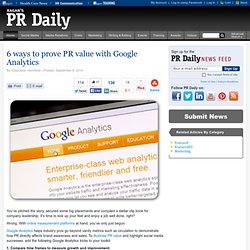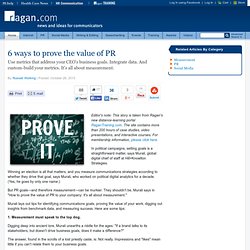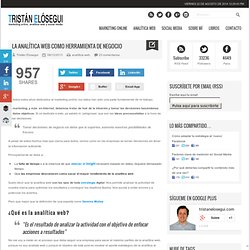

Next-Generation Social Analytics Are Transforming Digital Marketing. It wasn't so long ago that social media analytics meant looking at one-off engagements—fans, followers, likes—and using this info to make major campaign decisions.

That was the first generation of social marketing. Today, we're entering the third generation, and the landscape has never looked more exciting. The realms of both digital marketing and customer care have moved beyond the Web to social media, and marketers have incredibly advanced technologies at their disposal. Business leaders are asking for ROI and getting it thanks to social data. Likewise, crises can be detected—and averted—before they spin out of control. Sixty-three percent of marketers plan on devoting more resources to analytics during the next year, while a paltry six percent currently consider themselves leaders in that area, according to the CMO Council's State of Marketing 2014 report.
Here are five examples of what next-generation social analytics can do for your brand: 1. 2. 3. Marketing is Easy. Most ideas aren’t tested at all.

When a company starts being run by analytical people that changes. Now they want to test everything. When this happens most analytical folk go back to the Statistics 101 taught to them in academia. They create a null hypothesis and figure out how much data they need to disprove the null hypothesis. They run the tests and present the results to upper management. But while these ‘analytical’ companies pretend to run businesses that way, deep down, that’s not how they are actually doing it. Let me give you an example: Management has an idea for a new sales process.
New process is 10% better with 95% confidence interval of 8ppNew process is 5% better with 95% confidence interval of 8ppNew process is no improvement with 95% confidence interval of 8ppNew process is 5% WORSE with 95% confidence interval of 8pp In theory here is what should happen based on a null hypothesis of ‘it doesn’t do anything’: But we all know that is not what happens. Awesome! Another Way.
6 ways to prove PR value with Google Analytics. You’ve pitched the story, secured some big placements and compiled a stellar clip book for company leadership.

It’s time to kick up your feet and enjoy a job well done, right? Wrong. With online measurement platforms at hand, you’ve only just begun. Google Analytics helps industry pros go beyond vanity metrics such as circulation to demonstrate how PR directly affects brand awareness and sales. To illustrate PR value and highlight social media successes, add the following Google Analytics tricks to your toolkit: 1. Whether it’s a six-month success report, the end of a PR campaign, or just time for your weekly recap, using Google Analytics’ “compare to” time frame tool can show how your work contributes to website audience growth.
For the success report, you can compare traffic from the six months before PR plan implementation to the six months during your plan. 6 ways to prove the value of PR. Editor's note: This story is taken from Ragan's new distance-learning portal RaganTraining.com.

The site contains more than 200 hours of case studies, video presentations, and interactive courses. For membership information,please click here. In political campaigns, setting goals is a straightforward matter, says Murali, global digital chief of staff at Hill+Knowlton Strategies. Winning an election is all that matters, and you measure communications strategies according to whether they drive that goal, says Murali, who worked on political digital analytics for a decade. (Yes, he goes by only one name.) But PR goals—and therefore measurement—can be murkier. Murali lays out tips for identifying communications goals, proving the value of your work, digging out insights from benchmark data, and measuring success. 1. Digging deep into ancient lore, Murali unearths a riddle for the ages: "If a brand talks to its stakeholders, but doesn't drive business goals, does it make a difference?
"
Digital Marketing And Analytics: Two Ladders For Magnificent Success. La analitica web como herramienta de negocio vía. En todos estos años dedicados al marketing online, los datos han sido una parte fundamental de mi trabajo.

En marketing, y más en Internet, debemos tratar de huir de la intuición y tomar las decisiones basándonos en datos objetivos. Si os dedicáis a esto, ya sabéis lo ‘peligrosas’ que son las ideas preconcebidas a la hora de tomar decisiones. Tomar decisiones de negocio sin datos que la soporten, aumenta nuestras posibilidades de fracaso A pesar de estos hechos más que claros para todos, vemos como en las empresas se toman decisiones sin tener la información suficiente. Principalmente se debe a: La falta de tiempo o a la creencia de que obtener el insight necesario basado en datos, requiere demasiado tiempo.Que las empresas desconocen como sacar el mayor rendimiento de la analítica web. Suelo decir que la analítica web son los ojos de toda estrategia digital. Pero que mejor que la definición de una experta como Gemma Muñoz. How to Analyze Your Competition in Less Than 60 Seconds.
Social Media. Big Data. ROI. Google Analytics.